Growing up as an African American in mostly white Idaho Falls presented many challenges. One was limited education of African American history and traditions. Even today, schools provide little in the way of educating our students about the great contributions, horrific experiences and historic celebrations of African Americans.
Soon we will celebrate America’s independence and freedom with picnics, parades, music and fireworks. Independence Day commemorates the passage of the Declaration of Independence by the Continental Congress on July 4, 1776. However, the words, “We hold these truths to be self-evident, that all men are created equal, that they are endowed, by their Creator, with certain unalienable Rights, that among these are Life, Liberty, and the pursuit of Happiness” have always been problematic for the many excluded as created equal: women and African Americans.
In fact, Frederick Douglass, who also became a passionate supporter of women’s suffrage, made his own famous declaration as part of an Independence Day celebration on July 5, 1852: “What, to the American slave, is your 4th of July? I answer; a day that reveals to him, more than all other days in the year, the gross injustice and cruelty to which he is the constant victim. To him, your celebration is a sham; your boasted liberty, an unholy license; your national greatness, swelling vanity.”
Since Douglass’ speech, America has made great strides in the pursuit of freedom and equality for all. Perhaps the most historic is the ending of slavery. Unknown to many whites, a day recognizes the day that all Blacks were freed. Juneteenth, sometimes called Emancipation Day, is the oldest known U.S. celebration of the end of slavery.
Juneteenth commemorates June 19, 1865, when Union Maj. Gen. Gordon Granger arrived in Galveston, Texas, and announced that slaves were free, “In accordance with a proclamation from the Executive of the United States, all slaves are free.” It signaled freedom for Texas’s 250,000 enslaved people. This proclamation came more than two years after President Abraham Lincoln signed the Emancipation Proclamation.
The following year freed people in Texas organized the first of what became annual celebrations of “Jubilee Day.” Commemorations included music, barbecues, prayer services and other activities. As Blacks migrated from Texas to other parts of the country, Juneteenth celebrations spread. As Pulitzer Prize-winning author Isabel Wilkerson wrote in her book, “The Warmth of Other Suns: The Epic Story of America’s Great Migration”, “The people from Texas took Juneteenth Day to Los Angeles, Oakland, Seattle and other places they went.”
Unfortunately, many parts of the country have still never heard of Juneteenth. To my knowledge, Idaho Falls has never recognized Juneteenth. However, on June 15, 2020, Idaho Gov. Brad Little signed a proclamation that officially recognized June 19 as “Juneteenth National Freedom Day,” and this past Tuesday, the Senate unanimously approved a bill that would make Juneteenth a national holiday.
This Juneteenth, Saturday, the Bonneville Democrats will host a Facebook “Juneteenth Panel Discussion” at noon. Roberta Jordan, Byron Williams and I will be panelists on the program, with moderator LaMonica Richard, all of us people of color.
Dennis Patterson is the author of “Black Pearl: Living Black in Idaho.”
Register to join Juneteenth: https://us02web.zoom.us/…/reg…/WN_ZO4FaydQRiqkTRfc3YKwjw

